人教版book2句子翻译
- 格式:ppt
- 大小:86.50 KB
- 文档页数:20
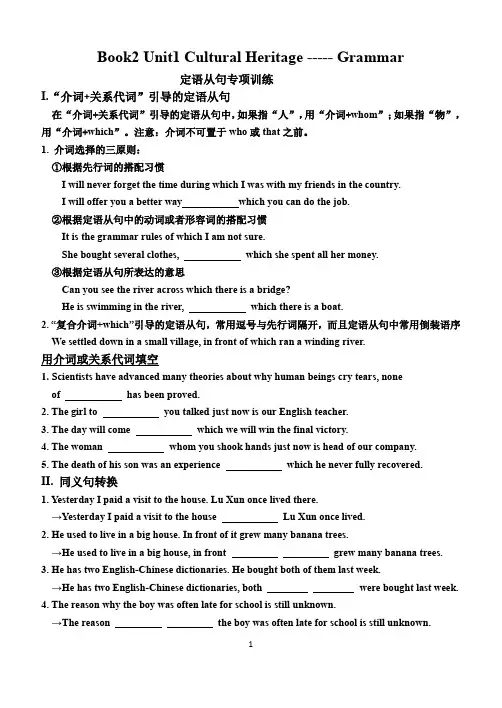
Book2 Unit1 Cultural Heritage ----- Grammar定语从句专项训练I.“介词+关系代词”引导的定语从句在“介词+关系代词”引导的定语从句中,如果指“人”,用“介词+whom”;如果指“物”,用“介词+which”。
注意:介词不可置于who或that之前。
1. 介词选择的三原则:①根据先行词的搭配习惯I will never forget the time during which I was with my friends in the country.I will offer you a better way which you can do the job.②根据定语从句中的动词或者形容词的搭配习惯It is the grammar rules of which I am not sure.She bought several clothes, which she spent all her money.③根据定语从句所表达的意思Can you see the river across which there is a bridge?He is swimming in the river, which there is a boat.2. “复合介词+which”引导的定语从句,常用逗号与先行词隔开,而且定语从句中常用倒装语序We settled down in a small village, in front of which ran a winding river.用介词或关系代词填空1.Scientists have advanced many theories about why human beings cry tears, noneof has been proved.2. The girl to you talked just now is our English teacher.3. The day will come which we will win the final victory.4. The woman whom you shook hands just now is head of our company.5. The death of his son was an experience which he never fully recovered.II. 同义句转换1. Yesterday I paid a visit to the house. Lu Xun once lived there.→Yesterday I paid a visit to the house Lu Xun once lived.2. He used to live in a big house. In front of it grew many banana trees.→He used to live in a big house, in front grew many banana trees.3. He has two English-Chinese dictionaries. He bought both of them last week.→He has two English-Chinese dictionaries, both were bought last week.4. The reason why the boy was often late for school is still unknown.→The reason the boy was often late for school is still unknown.5. He lives in a small village. To the west of it is a river.→He lives in a small village, to the west is a river.6. The lab is not far from here. The chemist often does experiments there.→The lab the chemist often does experiments is not far from here.7. Do you remember the days? In those days we played together.→Do you remember the days we played together?8. The palace was built in the 17th century. I often pay a visit to the palace.→The palace I often pay a visit was built in the 17th century.III.单句语法填空1. Wang Hong failed in the College Entrance Examination, disappointed his mother.2. All the books you offered have been given out.3. Peter,you met in London,is now back in Paris.4. I’ll never forget the day my hometown was liberated.5. I’ll never forget the days we spent together last summer.6. Keep the book in a place you can find it easily.7. This is the house was built by my grandfather forty years ago.8. The reason he gave to the teacher is unbelievable.9. She came around to explain the reason she was absent from the meeting.10. Maria has written two novels, both of have been made into television series.11. I still remember the time I first traveled by plane.12. is often the case, he was absent from school.13. China has the 3rd longest river in the world, name is the Yangze River.14. In the dark street there was not a single person whom she could turn for help.15. He wrote a letter he explained what had happened in the accident.IV. 语篇填空AThere was a time 1 I was tired of learning English and disliked speaking English. And this was the reason 2 my father forced me to join in a 30-day training in an English club before I went to senior high school. When I first came to the club, I met many strangers, 3__ made me miss my parents very much. So I packed up my things and wanted to go home. Fortunately, my guide, 4 teacher was Yu Minhong, communicated with me face to face, from 5 I gained some useful instructions. He also introduced a good partner to me, and we got along well with each other. Gradually I adapted to the life there. Every day I would talk to other teenagers and set down a series of activities 6 we did. Ishould be grateful to my father and the guide, 7 encouraged me to fall in love with English. Now I feel it interesting to learn English, into 8 I put my entire energy. Every day I read my words and passages aloud. In class, I join in English discussions. Before I go to sleep, I recall the passages, through 9 I can memorize a large number of new words.10 our English teacher says, “As long as you form the habit of learning English every day and have perseverance, you will master English sooner or later.”BThe United Nations (UN) is an organization 11 aims to promote international cooperation. It was founded in 1945 and has about 190 member states. This is the reason12 the UN has a huge number of translators and interpreters, since international meetings in the UN are attended by people 13 speak so many different languages. Translators are people 14 usually work with written language, while interpreters work with spoken language. Meetings 15 only two languages are used may need only one interpreter, while larger events 16 leaders from many countries gather may need over 70 interpreters.There are two main ways that an interpreter can provide spoken translation. First is the method 17 requires the speaker to stop every few sentences, so the interpreter can translate those sentences for the audience. The second method is the one 18 the interpreter listens and translates at the same time. This second method is more difficult, but the place 19 the interpreter is located is not so important. The interpreter can be in a completely different location from the speaker, listen through headphones, and translate for an audience sitting in another location!V. 翻译句子1. 我最喜欢的体育活动是打篮球。
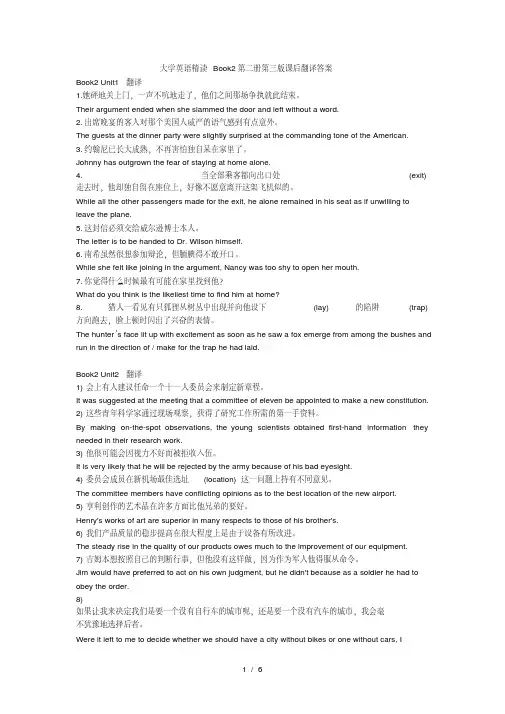
大学英语精读Book2第二册第三版课后翻译答案Book2 Unit1 翻译1.她砰地关上门,一声不吭地走了,他们之间那场争执就此结束。
Their argument ended when she slammed the door and left without a word.2. 出席晚宴的客人对那个美国人威严的语气感到有点意外。
The guests at the dinner party were slightly surprised at the commanding tone of the American.3. 约翰尼已长大成熟,不再害怕独自呆在家里了。
Johnny has outgrown the fear of staying at home alone.4. 当全部乘客都向出口处(exit) 走去时,他却独自留在座位上,好像不愿意离开这架飞机似的。
While all the other passengers made for the exit, he alone remained in his seat as if unwilling to leave the plane.5. 这封信必须交给威尔逊博士本人。
The letter is to be handed to Dr. Wilson himself.6. 南希虽然很想参加辩论,但腼腆得不敢开口。
While she felt like joining in the argument, Nancy was too shy to open her mouth.7. 你觉得什么时候最有可能在家里找到他?What do you think is the likeliest time to find him at home?8. 猎人一看见有只狐狸从树丛中出现并向他设下(lay) 的陷阱(trap) 方向跑去,脸上顿时闪出了兴奋的表情。
The hunter’s face lit up with excitement as soon as he saw a fox emerge from among the bushes and run in the direction of / make for the trap he had laid.Book2 Unit2 翻译1) 会上有人建议任命一个十一人委员会来制定新章程。
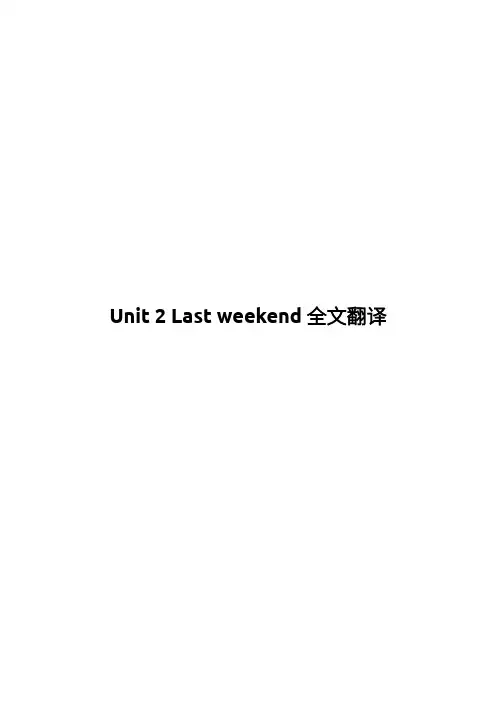
Unit 2 Last weekend 全文翻译Unit2《Last Weekend》Main生词本1. weekend 周末2. clean 打扫3. play football 踢足球4. wash 洗课文翻译Last weekend上周末What did you do last weekend?你上周末干什么了?I cleaned my room and washed my clothes on Saturday.我星期六打扫了房间,还洗了衣服。
Did you play football with Zhang Peng?你跟张鹏踢足球了吗?Yes, I did.是的,我踢了。
We played football on Sunday.我们星期日踢足球了。
Unit2 A Let's try & Let's talk生词本1.cleaned (clean的过去式)打扫2.stayed (stay的过去式)停留;待3.washed (wash的过去式)洗4.watched (watch的过去式)看课文翻译A Let's trySarah and Mike are talking about this weekend. Listen and circle.萨拉和麦克正在谈论这个周末。
听录音,圈出正确的答案。
Tomorrow is Monday.明天是星期一。
We will have class again soon.我们很快又要上课了。
Yes, we will. 是的。
How was your weekend, Mike?你周末过得怎么样,麦克?It was OK. 很好!I cleaned my room, and I watched TV.我打扫了房间,还看了电视。
I'm going to call my grandparents now.我现在要给我的爷爷奶奶打电话。
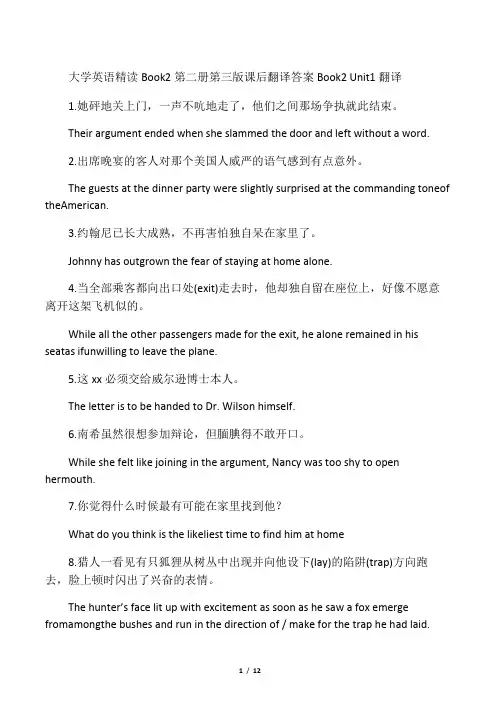
大学英语精读Book2第二册第三版课后翻译答案Book2 Unit1翻译1.她砰地关上门,一声不吭地走了,他们之间那场争执就此结束。
Their argument ended when she slammed the door and left without a word.2.出席晚宴的客人对那个美国人威严的语气感到有点意外。
The guests at the dinner party were slightly surprised at the commanding toneof theAmerican.3.约翰尼已长大成熟,不再害怕独自呆在家里了。
Johnny has outgrown the fear of staying at home alone.4.当全部乘客都向出口处(exit)走去时,他却独自留在座位上,好像不愿意离开这架飞机似的。
While all the other passengers made for the exit, he alone remained in his seatas ifunwilling to leave the plane.5.这xx必须交给威尔逊博士本人。
The letter is to be handed to Dr. Wilson himself.6.南希虽然很想参加辩论,但腼腆得不敢开口。
While she felt like joining in the argument, Nancy was too shy to open hermouth.7.你觉得什么时候最有可能在家里找到他?What do you think is the likeliest time to find him at home8.猎人一看见有只狐狸从树丛中出现并向他设下(lay)的陷阱(trap)方向跑去,脸上顿时闪出了兴奋的表情。
The hunter’s face lit up with excitement as soon as he saw a fox emerge fromamongthe bushes and run in the direction of / make for the trap he had laid.Book2 Unit2翻译1)会上有人建议任命一个十一人委员会来制定新章程。
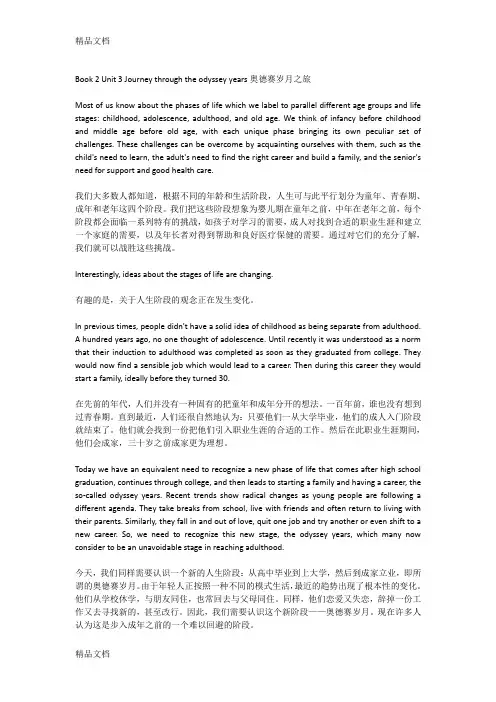
Book 2 Unit 3 Journey through the odyssey years奥德赛岁月之旅Most of us know about the phases of life which we label to parallel different age groups and life stages: childhood, adolescence, adulthood, and old age. We think of infancy before childhood and middle age before old age, with each unique phase bringing its own peculiar set of challenges. These challenges can be overcome by acquainting ourselves with them, such as the child's need to learn, the adult's need to find the right career and build a family, and the senior's need for support and good health care.我们大多数人都知道,根据不同的年龄和生活阶段,人生可与此平行划分为童年、青春期、成年和老年这四个阶段。
我们把这些阶段想象为婴儿期在童年之前,中年在老年之前,每个阶段都会面临一系列特有的挑战,如孩子对学习的需要,成人对找到合适的职业生涯和建立一个家庭的需要,以及年长者对得到帮助和良好医疗保健的需要。
通过对它们的充分了解,我们就可以战胜这些挑战。
Interestingly, ideas about the stages of life are changing.有趣的是,关于人生阶段的观念正在发生变化。
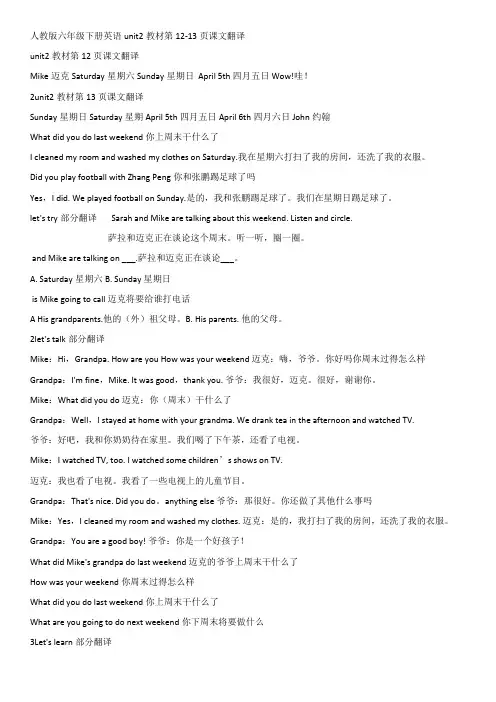
人教版六年级下册英语unit2教材第12-13页课文翻译unit2教材第12页课文翻译Mike迈克Saturday星期六Sunday星期日 April 5th四月五日 Wow!哇!2unit2教材第13页课文翻译Sunday星期日Saturday星期April 5th四月五日April 6th四月六日John约翰What did you do last weekend你上周末干什么了I cleaned my room and washed my clothes on Saturday.我在星期六打扫了我的房间,还洗了我的衣服。
Did you play football with Zhang Peng你和张鹏踢足球了吗Yes,I did. We played football on Sunday.是的,我和张鹏踢足球了。
我们在星期日踢足球了。
let's try部分翻译 Sarah and Mike are talking about this weekend. Listen and circle.萨拉和迈克正在谈论这个周末。
听一听,圈一圈。
and Mike are talking on ___.萨拉和迈克正在谈论___。
A. Saturday星期六B. Sunday 星期日is Mike going to call 迈克将要给谁打电话A His grandparents.他的(外)祖父母。
B. His parents. 他的父母。
2let's talk部分翻译Mike:Hi,Grandpa. How are you How was your weekend 迈克:嗨,爷爷。
你好吗你周末过得怎么样Grandpa:I'm fine,Mike. It was good,thank you. 爷爷:我很好,迈克。
很好,谢谢你。
Mike:What did you do 迈克:你(周末)干什么了Grandpa:Well,I stayed at home with your grandma. We drank tea in the afternoon and watched TV.爷爷:好吧,我和你奶奶待在家里。
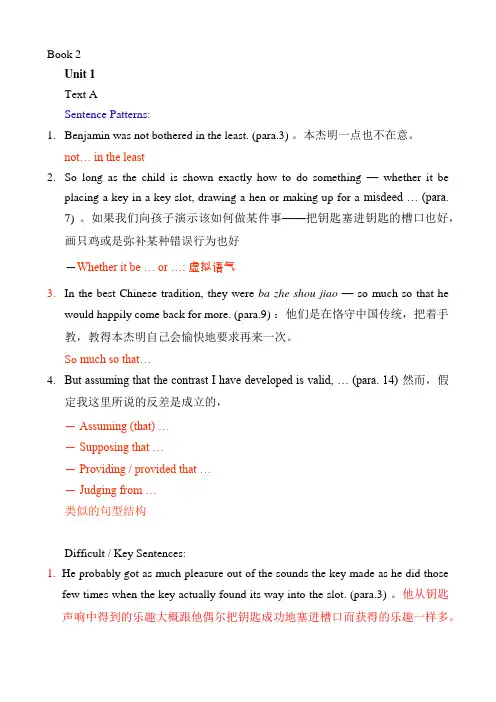
Book 2 Unit 1 Text A Sentence Patterns: 1. Benjamin was not bothered in the least. (para.3) 。本杰明一点也不在意。 not… in the least 2. So long as the child is shown exactly how to do something — whether it be placing a key in a key slot, drawing a hen or making up for a misdeed … (para. 7) 。如果我们向孩子演示该如何做某件事——把钥匙塞进钥匙的槽口也好,画只鸡或是弥补某种错误行为也好 — Whether it be … or …: 虚拟语气 3. In the best Chinese tradition, they were ba zhe shou jiao — so much so that he would happily come back for more. (para.9) :他们是在恪守中国传统,把着手教,教得本杰明自己会愉快地要求再来一次。 So much so that… 4. But assuming that the contrast I have developed is valid, … (para. 14) 然而,假定我这里所说的反差是成立的, — Assuming (that) … — Supposing that … — Providing / provided that … — Judging from … 类似的句型结构
Difficult / Key Sentences: 1. He probably got as much pleasure out of the sounds the key made as he did those few times when the key actually found its way into the slot. (para.3) 。他从钥匙声响中得到的乐趣大概跟他偶尔把钥匙成功地塞进槽口而获得的乐趣一样多。 2. The “teacher” would then smile somewhat expectantly at Ellen or me, as if awaiting a thank you – and on occasion would frown slightly, as if considering us to be neglecting our parental duties. (para.4) 然后那位“老师”会有所期待地对着我和埃伦微笑,似乎等着我们说声谢谢——偶尔他会微微皱眉,似乎觉得我俩没有尽到当父母的责任。 3. More generally, he is less likely to view life – as Americans do – as a series of situations in which one has to learn to think for oneself, to solve problems on one’s own and even to discover new problems for which creative solutions are wanted. (para.6) 从更广泛的意义上说,他就不太可能——如美国人那样——将人生视为一系列的情境,在这些情境中,一个人必须学会独立思考,学会独立解决问题,进而学会发现需要创造性地加以解决的新问题。 4. In terms of attitudes to creativity there seems to be a reversal of priorities: young Westerners making their boldest departures first and then gradually mastering the tradition; and young Chinese being almost inseparable from the tradition, but, over time, possibly evolving to a point equally original. (para. 11) 从对创造力的态度来说,优先次序似乎是颠倒了:西方的年轻人先是大胆创新,然后逐渐深谙传统;而中国的年轻人则几乎离不开传统,但是,随着时间的推移,他们同样可能发展到具有创新的境界。 5. Can we gather, from the Chinese and American extremes, a superior way to approach education, perhaps striking a better balance between the poles of creativity and basic skills? (para.14) 我们能否从中美两个极端中寻求一种更好的教育方式,它或许能在创造力与基本技能这两极之间获得某种较好的平衡?
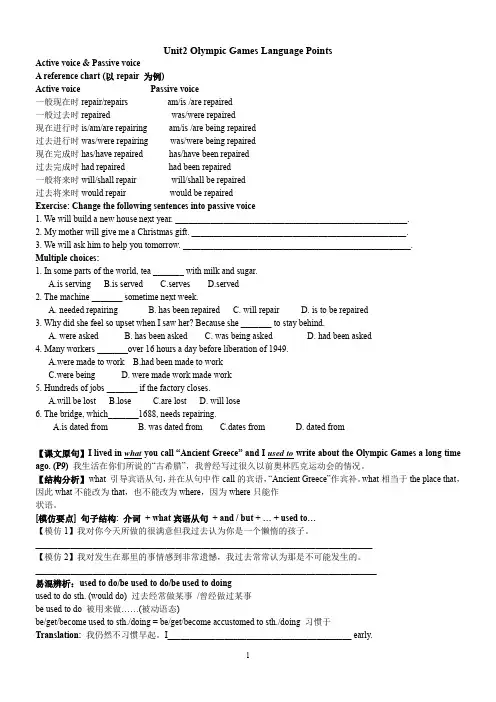
Unit2 Olympic Games Language PointsActive voice & Passive voiceA reference chart (以repair 为例)Active voice Passive voice一般现在时repair/repairs am/is /are repaired一般过去时repaired was/were repaired现在进行时is/am/are repairing am/is /are being repaired过去进行时was/were repairing was/were being repaired现在完成时has/have repaired has/have been repaired过去完成时had repaired had been repaired一般将来时will/shall repair will/shall be repaired过去将来时would repair would be repairedExercise: Change the following sentences into passive voice1. We will build a new house next year. _____________________________________________________.2. My mother will give me a Christmas gift. _________________________________________________.3. We will ask him to help you tomorrow. ____________________________________________________.Multiple choices:1. In some parts of the world, tea _______ with milk and sugar.A.is servingB.is servedC.servesD.served2. The machine _______ sometime next week.A. needed repairingB. has been repairedC. will repairD. is to be repaired3. Why did she feel so upset when I saw her? Because she _______ to stay behind.A. were askedB. has been askedC. was being askedD. had been asked4. Many workers _______over 16 hours a day before liberation of 1949.A.were made to workB.had been made to workC.were beingD. were made work made work5. Hundreds of jobs _______ if the factory closes.A.will be lostB.loseC.are lostD. will lose6. The bridge, which_______1688, needs repairing.A.is dated fromB. was dated fromC.dates fromD. dated from【课文原句】I lived in what you call “Ancient Greece” and I used to write about the Olympic Games a long time ago. (P9) 我生活在你们所说的“古希腊”,我曾经写过很久以前奥林匹克运动会的情况。
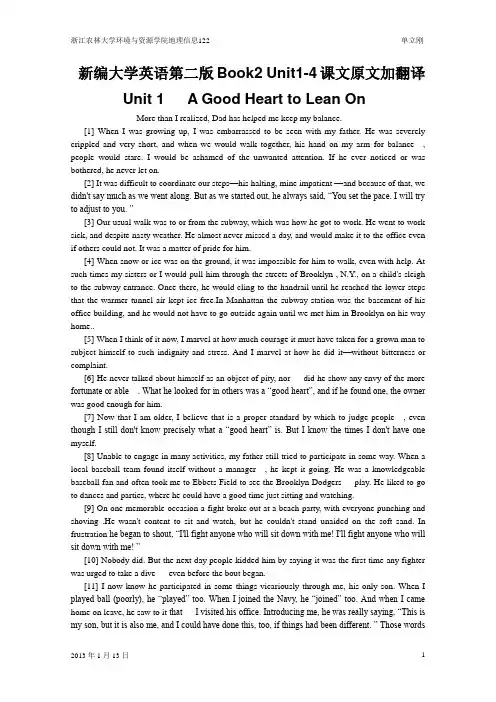
新编大学英语第二版Book2 Unit1-4课文原文加翻译Unit 1 A Good Heart to Lean OnMore than I realized, Dad has helped me keep my balance.[1] When I was growing up, I was embarrassed to be seen with my father. He was severely crippled and very short, and when we would walk together, his hand on my arm for balance , people would stare. I would be ashamed of the unwanted attention. If he ever noticed or was bothered, he never let on.[2] It was difficult to coordinate our steps—his halting, mine impatient —and because of that, we didn't say much as we went along. But as we started out, he always said, “You set the pace. I will try to adjust to you. ”[3] Our usual walk was to or from the subway, which was how he got to work. He went to work sick, and despite nasty weather. He almost never missed a day, and would make it to the office even if others could not. It was a matter of pride for him.[4] When snow or ice was on the ground, it was impossible for him to walk, even with help. At such times my sisters or I would pull him through the streets of Brooklyn , N.Y., on a child's sleigh to the subway entrance. Once there, he would cling to the handrail until he reached the lower steps that the warmer tunnel air kept ice-free.In Manhattan the subway station was the basement of his office building, and he would not have to go outside again until we met him in Brooklyn on his way home..[5] When I think of it now, I marvel at how much courage it must have taken for a grown man to subject himself to such indignity and stress. And I marvel at how he did it—without bitterness or complaint.[6] He never talked about himself as an object of pity, nor did he show any envy of the more fortunate or able . What he looked for in others was a “good heart”, and if he found one, the owner was good enough for him.[7] Now that I am older, I believe that is a proper standard by which to judge people , even though I still don't know precisely what a “good heart” is. But I know the times I don't have one myself.[8] Unable to engage in many activities, my father still tried to participate in some way. When a local baseball team found itself without a manager , he kept it going. He was a knowledgeable baseball fan and often took me to Ebbets Field to see the Brooklyn Dodgers play. He liked to go to dances and parties, where he could have a good time just sitting and watching.[9] On one memorable occasion a fight broke out at a beach party, with everyone punching and shoving .He wasn't content to sit and watch, but he couldn't stand unaided on the soft sand. In frustration he began to shout, “I'll fight anyone who will sit down with me! I'll fight anyone who will sit down with me! ”[10] Nobody did. But the next day people kidded him by saying it was the first time any fighter was urged to take a dive even before the bout began.[11] I now know he participated in some things vicariously through me, his only son. When I played ball (poorly), he “played” too. When I joined the Navy, he “joined” too. And when I came home on leave, he saw to it that I visited his office. Introducing me, he was really saying, “This is my son, but it is also me, and I could have done this, too, if things had been different. ” Those wordswere never said aloud.[12] He has been gone many years now, but I think of him often. I wonder if he sensed my reluctance to be seen with him during our walks. If he did, I am sorry I never told him how sorry I was, how unworthy I was, how I regretted it. I think of him when I complain about trifles, when I am envious of anoth er's good fortune, when I don't have a “good heart”.[13] At such times I put my hand on his arm to regain my balance, and say, “You set the pace. I will try to adjust to you.” ( 703 words)【译文】善良之心,久久相依1 随着我渐渐长大,当别人看见我和爸爸在一起,我会觉得很尴尬。
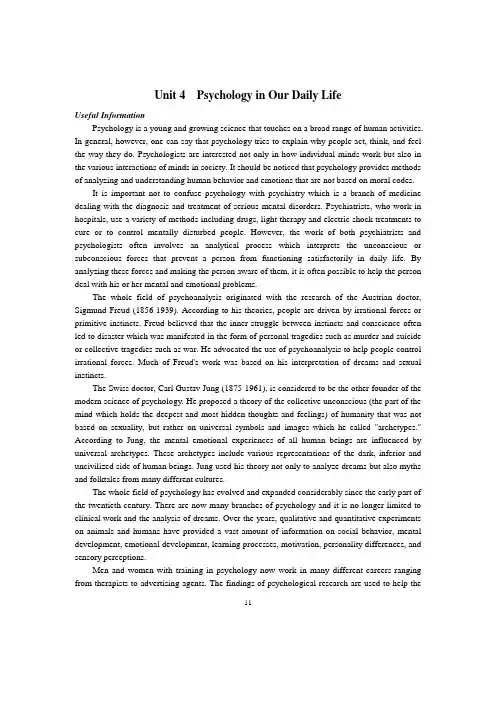
Unit 4 Psychology in Our Daily LifeUseful InformationPsychology is a young and growing science that touches on a broad range of human activities. In general, however, one can say that psychology tries to explain why people act, think, and feel the way they do. Psychologists are interested not only in how individual minds work but also in the various interactions of minds in society. It should be noticed that psychology provides methods of analyzing and understanding human behavior and emotions that are not based on moral codes.It is important not to confuse psychology with psychiatry which is a branch of medicine dealing with the diagnosis and treatment of serious mental disorders. Psychiatrists, who work in hospitals, use a variety of methods including drugs, light therapy and electric shock treatments to cure or to control mentally disturbed people. However, the work of both psychiatrists and psychologists often involves an analytical process which interprets the unconscious or subconscious forces that prevent a person from functioning satisfactorily in daily life. By analyzing these forces and making the person aware of them, it is often possible to help the person deal with his or her mental and emotional problems.The whole field of psychoanalysis originated with the research of the Austrian doctor, Sigmund Freud (1856-1939). According to his theories, people are driven by irrational forces or primitive instincts. Freud believed that the inner struggle between instincts and conscience often led to disaster which was manifested in the form of personal tragedies such as murder and suicide or collective tragedies such as war. He advocated the use of psychoanalysis to help people control irrational forces. Much of Freud's work was based on his interpretation of dreams and sexual instincts.The Swiss doctor, Carl Gustav Jung (1875-1961), is considered to be the other founder of the modern science of psychology. He proposed a theory of the collective unconscious (the part of the mind which holds the deepest and most hidden thoughts and feelings) of humanity that was not based on sexuality, but rather on universal symbols and images which he called "archetypes." According to Jung, the mental emotional experiences of all human beings are influenced by universal archetypes. These archetypes include various representations of the dark, inferior and uncivilized side of human beings. Jung used his theory not only to analyze dreams but also myths and folktales from many different cultures.The whole field of psychology has evolved and expanded considerably since the early part of the twentieth century. There are now many branches of psychology and it is no longer limited to clinical work and the analysis of dreams. Over the years, qualitative and quantitative experiments on animals and humans have provided a vast amount of information on social behavior, mental development, emotional development, learning processes, motivation, personality differences, and sensory perceptions.Men and women with training in psychology now work in many different careers ranging from therapists to advertising agents. The findings of psychological research are used to help the11victims of family violence, to design aptitude tests, to carry out efficiency studies in the workplace, to develop educational strategies, to conduct political campaigns, and to predict consumer spending. In fact, there is hardly any aspect of modern society that has not been influenced in some way by research in the field of psychology.Part One Preparation1. Describing the PicturesPicture 1: The patient looks sad. He is coming out of the hospital, carrying a test report in his hand. Judging from the black cloud hanging over the hospital, the drooping flowers and trees, and the report with the word “CANCER” on it, we can assume that he has had a series of tests. Picture 2: The man is lying in bed. The doctor has obviously prescribed all kinds of medicine because there are bottles of pills on the table beside the bed. There is also a piece of paper with the word “will” written on it. The m an is so depressed that he has written his will because he thinks he is going to die.Picture 3: The man appears extremely happy. The sun is shining over the hospital. The flowers and trees are upright. The doctor has told the man that he does not have cancer after all. (The report he is carrying has an “X” through the word “CANCER”.) On seeing the result, he can’t believe his eyes.Picture 4: The sun is shining, the trees are full of fruit and the hospital has disappeared. The man is happy. He appears to be singing or whistling. He takes a racket and heads off to play tennis. He is healthy and feels energetic again.Story:This is a story about a man who has been told that he is likely to have cancer. Then everything around him looks discouraging. He goes to bed, takes his medicine and writes his will because he is certain that he has cancer and his days are numbered. The next day, he goes back to the hospital and the doctor has good news for him: the test results indicate that he has no cancer. So he immediately feels happy, full of energy and goes to play tennis to enjoy himself.2. Getting to Know Your ClassmatesPossible reasons for the beliefs and feelings:--Those who love shopping may have a lot of money to spend and take delight in doing shopping. Sometimes they have a sense of accomplishment after shopping is done. In other cases, when people are in low spirits, they tend to do a lot of shopping.--Some people do not eat beef because of their religion. For example, Hindus do not eat beef. Others do not eat beef because of their family habits.--Bus service in some places is very poor. Buses are usually crowded and dirty. That’s why people don’t like to ride on a bus and when they are on a bus, th ey will get sick. The result will12probably be that they hate riding on a bus even more.--Those who love to talk to themselves are often timid and reserved. They can express their own feelings by doing so. Some people do so because they are not sure of themselves. They can practice talking to others in imagination, i.e., by imagining that they are facing other people and talking with them.--Some people are terrified of snakes because some snakes are poisonous. Other people hate them because they are ugly and disgusting.--People sometimes associate violence and ghosts with darkness. In darkness, people usually feel lonely and helpless. And at the same time, they are afraid that something bad may happen at any moment.--Some people think they are too fat when compared with those slim people around them. In most parts of the world, people are worried when they gain weight and try every means to keep thin. Everyone hopes to be good-looking or beautiful and follow the trend.--Those who hold on to their money as long as possible are usually very thrifty. They are afraid that if they spend all their money, they will have nothing to rely on. With as much money as they can save, they can at least have a sense of security.--People who hate queuing are impatient. They think it is a waste of time to queue. So they try to avoid queuing and some people jump the queue when possible.--People believe in ghosts if they have heard many ghost stories. Some people who have dreamed of ghosts may believe in them.--These people believe that everyone has a certain fate. It is fate that determines everything in their lives. They are anxious to find out what their future will be like. So they go to a fortune teller in order to know their future in advance.--These people care a lot about their physical appearance, for example, they want to be properly dressed in order to impress other people, or they probably are unconfident of themselves. So they would stand in front of a mirror for more than 10 minutes.3. A Fun Test: Come along on an Incredible Journey into the Desert!Based on Japanese Archetypes(模型)the desert represents a hardship. Each of the animalsrepresents an aspect of your life. The order in which you sacrifice the animals might be said to represent the importance of these things to you.The one that you sacrificed first is the least important, and the one that you kept is the most important.The cow represents basic needs.The sheep represents friendship.The lion represents pride.The monkey represents creativity.The horse represents passion.13Another fun test for your reference:1. You are walking to your boy/girlfriend’s house. There are two roads to get there. One is a straight path to take you there quickly, but is very plain and boring. The other is significantly longer but is full of wonderful sights and interesting things. Which one do you take to get to your boy/girlfriend’s house, short or long?2. On the way you see 2 rose bushes. One is full of red roses, and the other white roses. You decide to pick 20 roses for your boy/girlfriend, of any color combination. What number of white and red do you pick? (You can pick all of one color or any combo of the two).3. You finally get to their house. A family member answers the door. You can have him get your boy/girlfriend or go get him/her yourself. Which do you do?4. You go up to your boy/girlfriend’s room, but nobody is there. You decide to leave the roses there. Do you leave them by the windowsill (窗台) or on the bed?5. Later, it’s time for bed. You and your boy/girlfriend go to sleep in separate rooms. In the morning when it’s time to wake up, you go in his/her room and check on him/her. When you arrive, do you think he/she is most probably awake or asleep?6. Now it’s time to go back home. Do you take the short, plain road or the longer, more interesting road?The answers:1. The road represents your attitude towards falling in love. If you take the short road, you fall in love quickly and easily. If you take the long road, you take your time and do not fall in love as easily.2. The number of red roses represents how much you give in a relationship, while the number of white represents what you expect in return. For example, if you choose 18 red and 2 white, you give 90% and expect 10% in return.3. This question represents your attitude towards handling relationship problems. If you asked the family member to get your boy/girlfriend, then you like to avoid problems and hope that they will solve themselves. If you went to get him/her yourself, then you are a more direct person and like to work out problems immediately.4. The placement of roses determines how much you like to see your boy/girlfriend. Placing them on the bed means you like to see him/her a lot, while placing them on the windowsill means that you are all right with not seeing him/her as much.5. This is representative of your attitude towards their personality. If you find them asleep, you love your boy/girlfriend the way they are. If you find them awake, you expect them to change for you.6. The road to home tells how long you stay in love with someone. If you choose the short road, you fall out of love easily. If you choose the longer one, you will tend to stay in love for a long14time.Part Two Reading-Centered ActivitiesIn-Class ReadingI. Pre-ReadingSamples-- When I have health problems, I will go to the doctor. I want the doctor to examine me, to diagnose the problem, to write a prescription or to tell me if there is anything I should or should not do. If it is necessary, the doctor will give me some tests. Above all, I always expect that the doctor will tell me that I will be able to get over the problem or recover quickly.-- I usually avoid going to the hospital because to see a doctor is really tiring and time-consuming. So when I don’t feel well and it’s not a very serious case, what I usually do is to have a good rest. For example, when I have a cold, I will drink a lot of water and stay in bed. If it’s a serious health problem and I can’t recover by taking a good rest, I’ll go to the doctor and get some medicine. Just like most people, I hope the doctor will comfort me besides prescribing me the medicine.II. Passage ReadingWords, Phrases and Grammatical Points1. Sometimes all a sick person needs is some reassurance that all will be well.除了“reassurance”, 其它如fact, opinion, notion, suggestion, proposal, thought, news, truth,report 等词的后面也可接同位语从句。
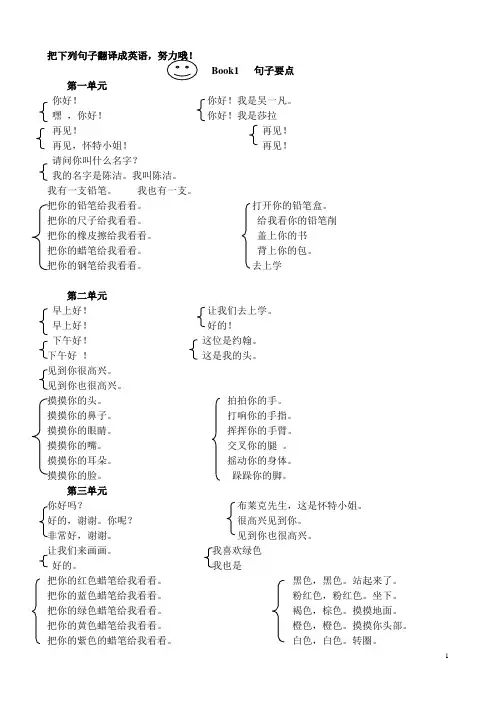
Book1 句子要点第一单元你好!你好!我是吴一凡。
嘿,你好!你好!我是莎拉再见!再见!再见,怀特小姐!再见!请问你叫什么名字?我的名字是陈洁。
我叫陈洁。
我有一支铅笔。
我也有一支。
把你的铅笔给我看看。
打开你的铅笔盒。
把你的尺子给我看看。
给我看你的铅笔削把你的橡皮擦给我看看。
盖上你的书把你的蜡笔给我看看。
背上你的包。
把你的钢笔给我看看。
去上学第二单元早上好!让我们去上学。
早上好!好的!下午好!这位是约翰。
下午好!这是我的头。
见到你很高兴。
见到你也很高兴。
摸摸你的头。
拍拍你的手。
摸摸你的鼻子。
打响你的手指。
摸摸你的眼睛。
挥挥你的手臂。
摸摸你的嘴。
交叉你的腿。
摸摸你的耳朵。
摇动你的身体。
摸摸你的脸。
跺跺你的脚。
第三单元你好吗?布莱克先生,这是怀特小姐。
好的,谢谢。
你呢?很高兴见到你。
非常好,谢谢。
见到你也很高兴。
让我们来画画。
我喜欢绿色好的。
我也是把你的红色蜡笔给我看看。
黑色,黑色。
站起来了。
把你的蓝色蜡笔给我看看。
粉红色,粉红色。
坐下。
把你的绿色蜡笔给我看看。
褐色,棕色。
摸摸地面。
把你的黄色蜡笔给我看看。
橙色,橙色。
摸摸你头部。
第四单元看!我有一只兔子。
我可以看一下吗?好酷! /好棒! /好棒! /哇!当然给你谢谢做猫一样的动作。
像老鼠一样觅食做鸭一样的动作。
像大象一样走路做大熊猫一样的动作。
像熊一样爬做猴一样的动作。
象鸟儿一样飞做兔子一样的动作。
像松鼠一样跳跃做狗一样的动作。
第五单元我喜欢汉堡包。
吃些薯条。
我也是。
谢谢。
谢谢。
我可吃些鸡肉吗?不用谢。
当然。
把汉堡包给我看看。
倒水。
把薯条递给我。
品尝茶。
切面包。
闻闻咖啡吃热狗。
给我看牛奶闻闻鸡肉。
喝果汁做蛋糕。
第六单元生日快乐!你几岁?你多大?谢谢我9 岁。
多少个蛋糕?这是给你的。
一个蛋糕。
谢谢。
让我们吃生日蛋糕。
好的!吹气球1, 2 给我看1和2 。
拍球。
3, 4 给我看3和4 。
放风筝。
5, 6 给我看5和6 。
掷飞机。
7, 8 给我看7和8 。
Unit 5 Dreams课内阅读参考译文你做梦吗?1 梦,我们为什么会做梦?梦有意义吗?真的有梦中所见的事成为现实这种事吗?几千年来这些问题一直让人们感兴趣。
过去几十年的科学发展对睡眠的自然过程有了较多的认识,然而对于与梦有关的诸多问题依然没有提供最终的答案,这些问题还要继续困惑我们。
2 人人都做梦——只不过有些人不记得做过梦罢了。
人类脑电波的记录显示我们所有人入睡后就进入梦境。
整个夜晚的大多数时间我们都在做梦,但只有当我们处在REM (眼睛迅速转动) 睡眠阶段时醒来,才会记住所做的梦。
眼睛迅速转动阶段便是我们做梦的时候。
每晚我们有四、五个REM睡眠阶段,第一次出现在入睡后的90分钟左右。
此后,梦期每90分钟复现一次,每次持续15到45分钟,持续时间随着夜晚的深入逐渐增长。
3 睡眠的主要目的(除让我们休息外)也许就是让我们做梦——让我们以一种截然不同的方式回顾我们的生活、我们的忧虑和希望,以及在潜意识中观察自我,把不再需要的资料从记忆中剔除。
4 有些梦可能是由简单的生理原因引起的。
例如,梦到在灼热的煤块上行走很可能是因为睡眠时脚太靠近取暖器。
而梦到想跑但两腿却动弹不了这种令人沮丧的境况,也许是被子裹得太紧的缘故。
闹铃响了而依然熟睡的人则很可能会梦到门铃或电话铃响。
所有这些都是潜意识和意识共同引导和启示我们的简单例子。
5 不过这些从生理的角度进行的解释尚不足以说明为什么我们会做梦。
有些人认为梦纯粹是无稽之谈,仅仅是人脑中电脉冲无的放矢的结果,然而,有些人则认为最简单的梦都具有重要的含义。
6 有些梦反映的内心忧虑是立即可以识别的。
梦见失去工作或者没了房子,也许是反映了真实的忧虑,即便这些忧虑只是潜意识的。
我们大多数人都梦见过必须参加一门很难的课程的期末考试,也许是一门从未修过的,或许是学得很糟的课程。
7 但是,有一些梦并没有这样明显的含义,这是怎么回事呢?多个世纪以来,男男女女都从所谓的解梦字典中寻找答案,这类字典最早的可以追溯到公元前5000年。
第十四课亦爱亦恨话纽约托马斯·格里非斯1.那些赞美“大苹果”的广告活动,还有那些印着带有“我爱纽约”字样的心形图案的T恤衫,只不过是它们在绝望中发出悲哀的迹象,只不过是纽约这个非凡的城市日趋衰落的象征。
纽约过去从不自我炫耀,而只让别的城市去这样做,因为自我炫耀显得“小家子气”。
纽约既然是独一无二的、最大的而且是最好的城市,也就没有必要宣称自己是如何与众不同了。
2.然而,今日的纽约再不是头号城市了。
至少,在开创时尚、领导潮流方面,纽约是再也配不上这个称号了。
今日的纽约非但常常跟不上美国政治前进的步伐,而且往往也合不上美国人生活情趣变化的节拍。
过去有一个时期,它曾是全国流行服装款式方面无可争议的权威,但由于长期抵制越来越流行的休闲服装款式而丧失了其垄断地位。
纽约已不再是众望所归、纷起仿效的对象了,如今它甚至以成为风行美国的时装潮流的抵制者,以成为摆脱全国清一色的单调局面的一隅逃遁之地面自鸣得意。
3.纽约无力保持排头兵的地位这一点已是越来越明显了。
有十多座其他城市都已经有了一些在建筑艺术上很富有创造性的建筑物,·而纽约最近二十年来所造的任何一幢建筑物都不能与之相比。
曾是托斯卡尼尼全国广播公司交响乐团演出场所的巨人般的曼哈顿电视演播厅,现在经常是空无一人,而好莱坞大量生产出的情景喜剧和约翰尼·卡森节目的实况转播却占满了加利福尼亚的广播电视发送频道。
美国流行歌曲创作发行中心从纽约的廷潘胡同转移到了纳什维尔和好莱坞。
拉斯韦加斯的赌场经常出高薪聘请曼哈顿没有哪一家夜总会请得起的歌手和艺员。
而体育运动方面,那些规模较大的体育馆、比较激动人心的球队以及热情最高的球迷们,往往都出现在纽约以外的地方。
4.纽约从来都不是召集会议的好场所——因为那儿少友情,不安全,人口拥挤,消费高昂——但现在它似乎正在一定程度上争回其作为旅游胜地的地位。
即便如此,大多数美国人对新奥尔良、旧金山、华盛顿或迪斯尼乐园等地的评价可能还是高于纽约。
人教版六年级下册英语unit2教材第12-13页课文翻译unit2教材第12页课文翻译Mike迈克Saturday星期六Sunday星期日 April 5th四月五日 Wow!哇!2unit2教材第13页课文翻译Sunday星期日Saturday星期April 5th四月五日April 6th四月六日John约翰What did you do last weekend?你上周末干什么了?I cleaned my room and washed my clothes on Saturday.我在星期六打扫了我的房间,还洗了我的衣服。
Did you play football with Zhang Peng?你和张鹏踢足球了吗?Yes,I did. We played football on Sunday.是的,我和张鹏踢足球了。
我们在星期日踢足球了。
let's try部分翻译 Sarah and Mike are talking about this weekend. Listen and circle.萨拉和迈克正在谈论这个周末。
听一听,圈一圈。
1.Sarah and Mike are talking on ___.萨拉和迈克正在谈论___。
A. Saturday星期六B. Sunday 星期日2.Who is Mike going to call? 迈克将要给谁打电话?A His grandparents.他的(外)祖父母。
B. His parents. 他的父母。
2let's talk部分翻译Mike:Hi,Grandpa. How are you? How was your weekend? 迈克:嗨,爷爷。
你好吗?你周末过得怎么样?Grandpa:I'm fine,Mike. It was good,thank you. 爷爷:我很好,迈克。
很好,谢谢你。
Mike:What did you do? 迈克:你(周末)干什么了?Grandpa:Well,I stayed at home with your grandma. We drank tea in the afternoon and watched TV.爷爷:好吧,我和你奶奶待在家里。
Unit 3 Born to WinIn-Class Reading课内阅读参考译文生而成功一个人不可能事事由别人来教你,只能在别人的帮助下靠自己去发现。
——伽利略1 每个人生来都是独特的,与众不同的。
每个人都有能力以自己特有的方式去赢得成功。
每个正常人都能够看、听、触摸、品尝并且思考自己的事情。
每个人都有自己特有的潜在性――能力和局限性。
每个人都能凭自己的本事成为举足轻重、会思考、明事理、创造性成果颇多的人——一位成功的人。
2 “成功者”和“失败者”这两个词有多种意思。
当我们把一个人称作成功者时,我们所指的并不是那种通过优势战胜他人而获得成功的人。
而是一个无论是作为个体或是社会的成员他都能可靠、迅速地采取行动做出真诚回应的人。
失败者是一个不会采取行动作出真诚回应的人。
3 很少有人是绝对的成功者或失败者。
这(成败)只是一个程度的问题。
然而,当一个人一旦具有了成为成功者的能力时,(他)经常获得成功的可能性就会更大。
4 对成功者来说成就不是最重要的;最重要的是真诚。
真诚的人知道自己的独特之处,也赞赏他人的这一特点。
5 成功者是不怕独立思考并运用自己知识的。
他能把客观事实与主观意见区分开来,而且不会装作能解决一切问题。
他倾听他人、评价他们说的话,却能得出自己的结论。
6 成功者能灵活变通。
(他)遇事不会采用已有的、刻板的方式行事。
他能根据形势的需要改变自己的计划。
成功者热爱生活。
他乐于工作、喜爱游玩、享受美食、欣赏他人和自然带来的乐趣。
他心安理得地欣喜自己的成就。
他(也)毫无妒忌地欣赏他人的成绩。
7 成功者关心天下、关爱世人。
他贴近社会上普遍存在的问题。
他努力提高生活质量。
即使面对国内和国际上的难题,他也不会认为自己是无能为力的。
他做一切力所能及的事,使世界变得更美好。
8 即使人们生来注定会成功,但也是生来就要完全依赖于周围环境的。
成功者顺利地完成从依赖到独立的转变。
失败者则没有做到这一点。
在这一过程的某个时候失败者开始回避独立。